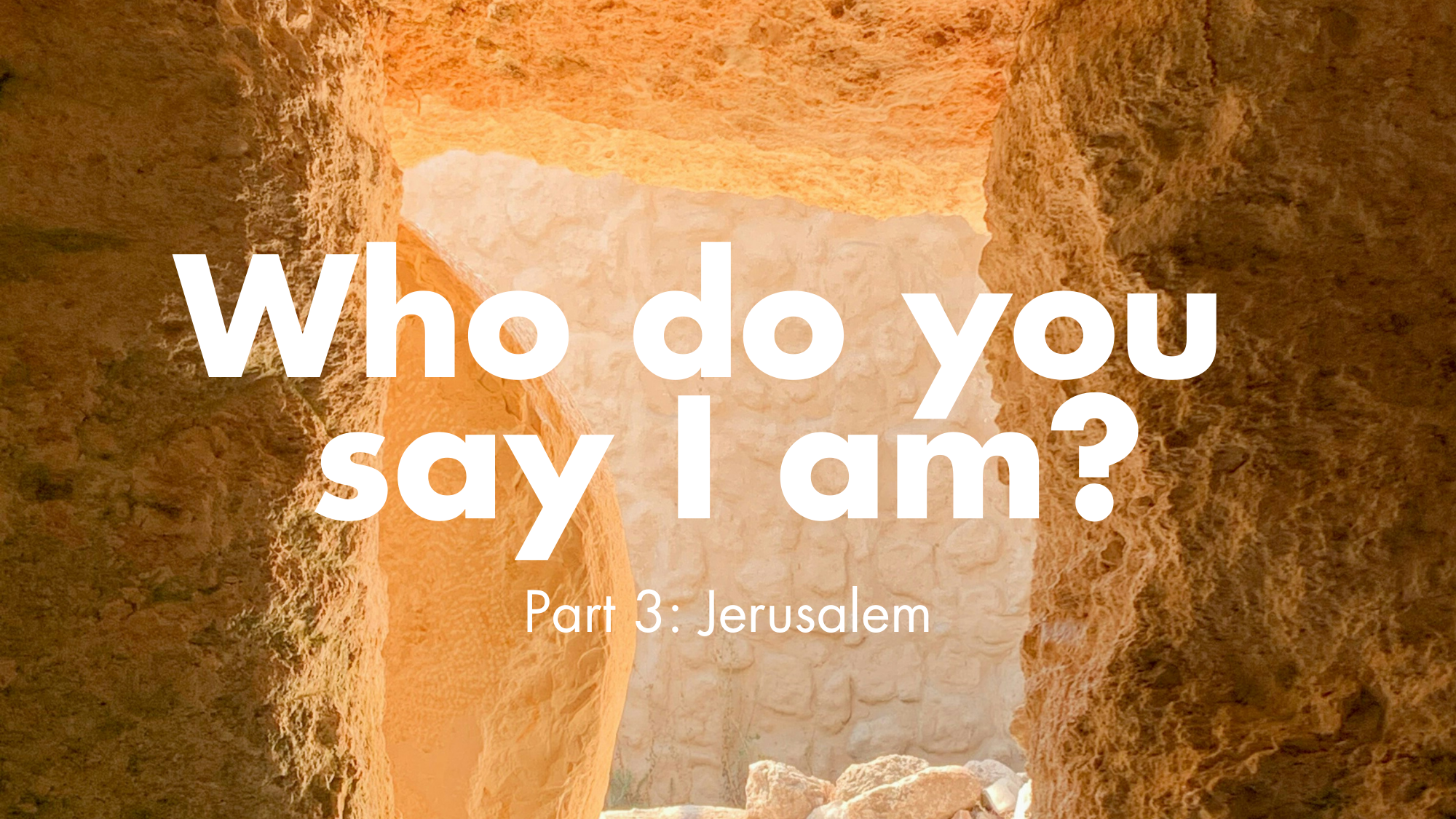
Jesus, the resurrected one. (EASTER)
The resurrection is emphatic: Jesus is said to have bodily risen in time and space at a moment in history. The resurrection is neither mythical, nor metaphorical. It happened, and it changed the world forever.
To a world lost to wishy washy relativism, Jesus’ victory over death is the most sure absolute anyone can build a life on. And the resurrection is transformational. The victory of God means the end of fear and the end of any lack of purpose. Those who live in the light of resurrection are able not to be alarmed, and to go: go and live lives of meaning. And the resurrection is grace. It’s the gift of God to a world in need. Grace transforms everything.
Thank God for Easter.
By Ed Flint

Jesus the irenic, innocent, indestructible one.
At Jesus’ trial before Pilate, the crowd call for Jesus’ crucifixion and Barabbas’ release.
Barabbas represents violent rebellion, in contrast to Jesus’ refusal to defend himself. Whether we like to admit it, there is something in all of us that can find brutal aggression more compelling than the way of Jesus. When this happens it’s like we’re in the crowd crying for Barabbas to be set free.
But Jesus is more than just an example of non-violence. He is also Barabbas’ substitute. And He is ours too. He does what no human before or since could do. His inncoent death is like a lightening rod for all our human corruption and guilt. In His body He absorbs Barabbas’s sin, our sin, and all the sin of the world. And, in death, he kills off all evil, setting us, like Barabbas, free. His revolution is not a human one, it is eternal.
Unlike any other revolution, it cannot be held back. It is indestructible. As such, it is the only revolution worthy of our lives. When we commit ourselves to it, we commit to the only way the world will ever be fundamentally redeemed.
By Ed Flint

Jesus, beloved son.
We’ve made it to Jesus’ point of no return in His journey to the cross; a well-known scene in the garden of Gethsemane, where He will beseech his followers to stay awake and pray with him as He pleads with His Father for another way. The language used builds to a picture of abject horror, and is another picture of human Jesus displaying the holiness of a raw emotional response that we should come to when we face loss, death and pain in this life.
Of course, Jesus’ horror is beyond anything we will ever face, and embedded within this scene is some vital theology. Did the Father send Jesus to do battle with death and darkness on the cross to satisfy His wrath (our reformation forefathers would have us think so)? Or did the triune God, together, devise this ancient plan to redeem their beloved world from the very beginning?
A clear understanding on this can change the way we read all that tricky stuff in the Old Testament, and revolutionize what it is to be included in this divine relationship, for all of us.
By Hannah Flint

Jesus, the victim of betrayal and denial.
In Mark 14, Jesus doesn’t directly accuse Judas, but keeps his prediction about the identity of his betrayer ambiguous. Part of the reason is to show that any of his disciples were, and by extension, any of us are, capable. We all have a bit of Judas in us. We can treat Jesus as a commodity, to be discarded when we don’t get what we want from him.
And, we all have a bit of Peter, too. Peter is so sure of himself he doubles down on his insistence he won’t deny Jesus. We can trust our own righteousness in similar ways. In all this, Jesus knows exactly what we’re all like. It means he goes to his death abandoned and betrayed. But he’s not defeated. And, as with Judas, he leaves the door open to us to turn around, be forgiven, and enjoy him and his presence, for its own sake, once again.
By Ed Flint

Jesus, our divine rescue.
The combined feasts of Passover and Unleavened Bread are the most important of all the annual Jewish feasts. They commemorate God’s rescue of the Hebrews from the “plague of the firstborn” during the time of Moses, where God’s people were spared death by applying the blood of lambs upon the doorframes of their homes. The feasts also remember the hasty release and exodus of the Hebrews from their cruel treatment and enslavement by Pharaoh, king of Egypt.
So that they would always remember his saving acts, God told the Jews to commemorate this “divine rescue” from death and bondage through these two feasts, which were to be celebrated every year—at the same time and in the same way—without fail.
Jesus and his disciples had travelled to Jerusalem to commemorate Passover before, but the one we read about in Mark 14:12-26 would be entirely different. As Jesus told his disciples during this particular Seder meal, it would become the occasion of his death by crucifixion, and the timing was no mere coincidence.
By Keith Beebe

Jesus, suffering friend.
We have reached the passion narrative at the end of Mark’s gospel, which will take us all the way to Easter Sunday. This first event - Jesus’ anointing by the woman - is recorded in all four gospels, and it’s very easy for us to forget quite how remarkable it is, not only that this woman was Jesus’ close friend and follower, but that the gospels recorded this intimate moment at all (women weren’t held in particularly high regard in these days, to put it mildly).
Yet this scene shows us so much; what we see is Jesus' deep love of his friend, who was the only one who was actually hearing him. This scene is an invitation to know Jesus’ humanity in deeply profound ways.
By Hannah Flint

Jesus, the one who will return.
During his week in Jerusalem, Jesus prophecies about two future events: the destruction of the temple and his second coming. Jesus gives detailed signs about when the temple will be destroyed, so his disciples will know to leave Jerusalem beforehand; but about his return, he says no-one, not even he, knows when this will be. What he does make clear is that his return will be glorious, and we as his followers should be watchful for it.
So, the timing of his second coming is something we do not need to obsess over, but it is something we can draw comfort, reassurance, and purpose from. Those who know Jesus is in control of the future, is all-powerful, and will ultimately return to make everything right, can navigate the chaos of this world with joy, hope and an expectant watchfulness.
By Ed Flint

Jesus, the revolutionary.
During Jesus’ life, the subject of revolution was never far away. When he is asked about paying taxes to Caesar, the question behind the question is this: ‘Are you a revolutionary?’ Jesus’ response amazes the crowd. He says both ‘yes’ and ‘no’. No, he is not a revolutionary like any revolutionary before or after. But yes, he is a revolutionary unlike the world has or will ever see. His revolution is not of political but of cosmic, supernatural power. His is the revolution of bringing heaven to earth. His is a revolution of the defeat of sin and greed and lust for power.
As such, it is the only revolution worthy of our time. And he beckons us not just to enjoy the fruits of it, but to extend it to a world in need. In a time of political turmoil and anguish in our own country, remembering that in the face of similar chaos, Jesus’ focus remained fixed on the Kingdom of God is timely. We’re made for the kingdom that is both eternal and material, now, and not yet. Let us embrace it as the only hope for a world in need.
By Ed Flint

Jesus, the storyteller.
Jesus' confrontation with Israel’s leaders continues to build in Mark, as we reach the parable of the tenants. In it, he likens them to tenant farmers who reject the authority of the vineyard owner (God) and His servants (the prophets), and foreshadows their ultimate rejection of Him, the son.
We know that Jesus came to fulfill Israel’s covenant with God - the law and everything that involved - but we should not ignore the deeper message behind the parable speaking to us today. Seeking control, putting ourselves in God’s place as owner and the worship of other idols, are still the crux of our fallen human state. A message that confronts as much today, as it ever did, but by the power of the spirit, because of His unwavering grace, surrendering control will be all of our life's work.
By Hannah Flint

Alpha day return.
Concluding the theme of the alpha day away, we look at the person and work of the Holy Spirit. Paul says as Christians we have an obligation to be people of God’s Holy Spirit. This means knowing who he is, what he does and how we can grow in our experience of him. We’re told the Spirit adopts us, frees us, makes us joyful and empowers us. An ongoing experience of all these things is vital to our growth as Christians.
By Ed Flint

Jesus, the clearer of the temple.
Jesus’ first significant acts in Jerusalem are to curse a fig tree and clear the Temple courts. The two are related. Jesus’ intention is not to call the temple sacrificial system to reform, but something more dramatic: to prophesy its destruction. It is no longer fit for purpose. God’s presence will no longer reside in a building, but in the temple of Jesus’ followers’ hearts. And the atoning temple sacrifice will be once and for all replaced by Jesus’ bodily sacrifice on the cross.
In light of this, all attempts to save ourselves or our world at the altar's culture offers are futile. But when we receive the gift of God's presence at the core of our very beings, achieved for us by Jesus at the cross, we are enabled and empowered to live out the lives that offer real salvation to us and our communities. This is how Jesus saves the world.
By Ed Flint

Jesus, the Humble King.
In Mark 11:1-11, Jesus finally arrives into Jerusalem, the place that he has laid out as where he will spend his final days. By riding into town on a donkey, he is not only fulfilling the prophecy laid out to us in Zechariah 9:9, but also is subverting expectations of what it means to be a king. This approach, while completely countercultural then and now, invites Jesus' followers to walk in similarly humble footsteps.
Jesus is building with us a KIN-dom relationship -- where we become partners alongside him and continue the work that Jesus started. Through this passage, he demonstrates to us what can happen when we allow God to move, when we involve others in our lives, and when we admit that maybe we don't know best. Jesus' humility is an invitation to us to embrace the gifts we have not for our own glory or satisfaction, but for the good of others.
By Rebekah Covington

Are you ready? You’re up.
Our beloved treasurer, board member, and spirit-filled friend Casey delivers his first (and final) sermon before he leaves for a new chapter abroad.
Jesus uses whoever is available, regardless if they’re listening, qualified, “ready,” etc. In this farewell word, Casey uses the callings of Samuel and Matthew (in 1 Samuel and Luke respectively) to look back at the last 10 years of bread - where we’ve come from, and where we’re headed.
As Casey departs, we’re left with a challenge - what might this community look like, in 2025 and beyond, if we take the words of Jesus, to follow Him, seriously? Who will be called, and to what, if we truly open ourselves up to the power of the holy spirit?

Jesus, the one who calls.
Jesus steps down from his mountaintop experience of glory into the chaos of scribes, crowd, demonic oppression, and most importantly, the other disciples’ failure to represent Him in their battle with evil. They have not remembered what they have been taught. They have not been able to manage without him, and it shows us (and it showed Jesus) quite how far they still have to go, in their journey as His disciples.
Commentators call this section of Mark’s gospel ‘a study of discipleship,' and as we continue to follow Him in our response to great need in our city, this passage could not be more timely. In it, we see Jesus' call be undermined as ours will always be too; we see Jesus' authentic frustration about that, and yet His doubling-down in commitment to His mission; and we see how it is that He keeps going to fulfill what He has been called to.
For any of us asking ‘where do we go from here,’ let’s look again at Jesus' example, and let Him remind us what it looks like to follow Him.
By Hannah Flint

Jesus, the glory of God.
The transfiguration is a rare moment of respite and balm for both the disciples, and Jesus, in the middle of the struggles of ministry. Despite the teaching, the healing, the deliverance and the miracles, Jesus is still opposed, threatened and misunderstood. Even his closest friends don’t really get it. And soon, he will make it to Jerusalem where suffering and execution await.
But here, on the mountain, Jesus is glorified. It is a moment of glory and wonder: the cloud of God’s presence enveloping all who witness it. It must have been wonderful to experience! If Jesus needed such a moment of respite from the brokenness of the world, how much more do we?
This week in Los Angeles has been a terrible reminder of the chaos of our world. But, thanks to Jesus, his glory and the presence of God is available to us all the time. This talk is a call to worship the divine Son of God and enter into his presence. Especially in times of trouble, there is no better place for us to be. In his presence, we are transformed - our motives, our prayers, our thoughts, and our desires are all aligned with his - and we are best able to be his people to a world in need.
By Ed Flint

Jesus, the Christ.
As we kick off the new year, we continue our series in Mark’s gospel. For many, this time of year is about making new resolutions. Jesus, though, comes to bring something greater than anything human resolve will ever accomplish. He knows our fundamental need is not a material one, but a spiritual one. So, he warns that whilst we may gain the whole world through our human endeavors, we can still lose our soul. Only he can achieve for us the life free from the power of sin that we so fundamentally need. And, he bids us give our whole self to him, so we can rise with him to the fullness of a life, no longer controlled by sin, which we most crave.
So, let us make this our one resolution for this, and every coming year: to be people who give up themselves to Jesus, to take up our cross and follow. This is where real life is to be found.
By Ed Flint

Advent 2024: Glory
This week, we take a closer look at one of the most well-known parts of the Christmas story: the angels appearing to the shepherds. Who were the shepherds, and how can we relate to them? What is God’s glory, how is it used throughout the Bible, and how can we live Into our identity as image (glory)-bearers of God?
By Tavia Grubbs


Advent 2024: Christmas Joy
For as long as our history is traceable, we homo sapiens have been progressing, and by all accounts we’re set to hit warp speed on all that with the dawn of AI. But the Christian joy that is celebrated at Christmas is not about progress, it’s about a different kind of rescue altogether.
The wisdom of God stands totally outside of all our ideas of progress and advancement (which we’d be fools to put too much faith in, if we look lack in earnest at our past) What Jesus came to do was to set us right on a cosmic level - forever, and completely. And what the spirit is here for, is our daily access to Him, while we wait for the life we were always made for.
By Hannah Flint

Jesus, deliverer from distress.
There is an epidemic of anxiety in the west. 50 million people in US have been diagnosed with an anxiety disorder. The number is rising. In today’s talk we find the disciples in distress. Something they experience whenever they are, or feel, separated from Jesus. This is something we will all experience. Whenever we’re dislocated from Jesus, our anxiety will rise, because we’re made for closeness to him. But Jesus meets his disciples in all his power. He is the lord of glory - the great I am. He displays his authority over all evil by trampling on the waves of the deep. And his compassion and closeness is seen as he gets into the boat with his troubled disciples. And as soon as he does so he alleviates all their fear.
By Ed Flint
